Vyhledávání
Odkazy
Special issues
Petr Pavlas, Lenka Řezníková, Lucie Storchová (eds.): Cognitive Metaphors and Encyclopaedic Knowledge. Exploring Semantic Transformations in Early Modernity
Special Issue of The Philosophical Journal 1/2025
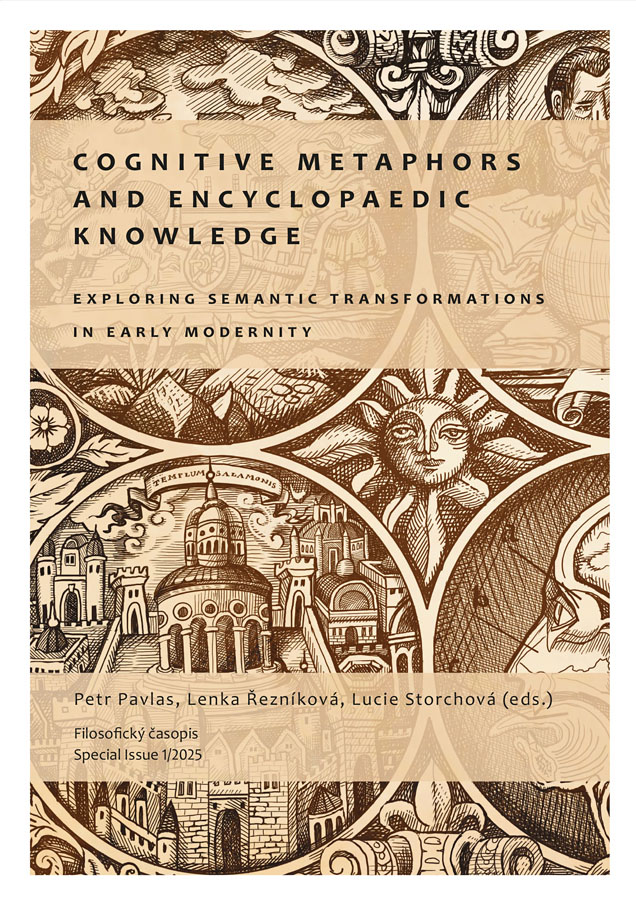
Metaphors in science, philosophy, and the arts are fundamental to the history of thought, serving not only to simplify complex matters but also to foster invention, speculation, and theory. Among other functions, they played an important role in the emergence of modern ideas of the encyclopaedia and encyclopaedism, thereby contributing to programs of universal knowledge, general education, and, more recently, open science. While conceptual history is widely recognised as crucial and has been thoroughly studied, the history of metaphors has so far remained in the background. This publication aims to bring it to the forefront.
Aleš Novák (ed.): Pochybovat, ujišťovat, podrobit se. K_filosofickému dílu Blaise Pascala
Mimořádné číslo Filosofického časopisu 3/2024
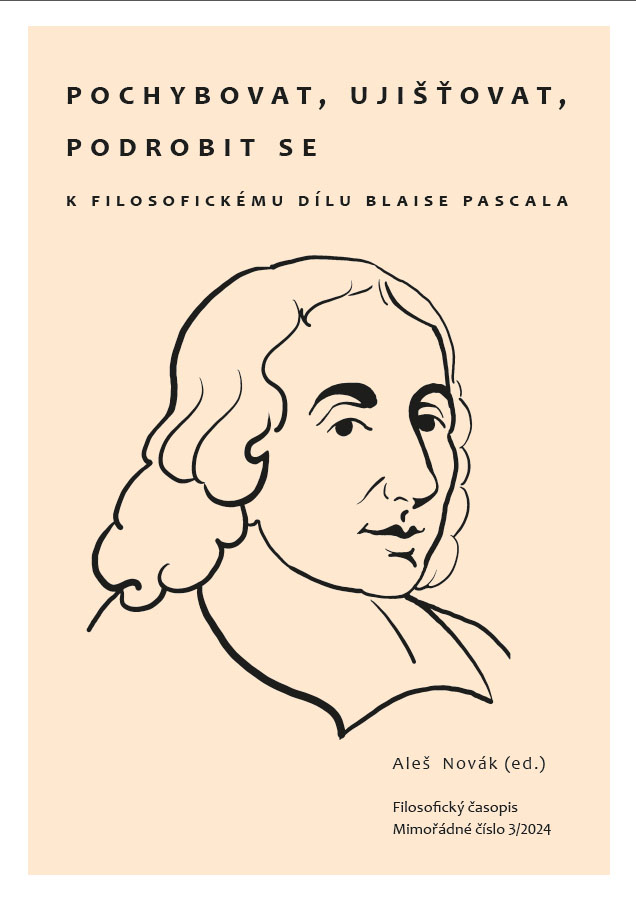
V roce 2023 uplynulo 400 let od narození francouzského matematika, filosofa a hlavně křesťana Blaise Pascala. Při této příležitosti proběhla na Fakultě humanitních studií Univerzity Karlovy konference nazvaná Blaise Pascal 400: Pochybovat, tvrdit, odevzdat se. Jednotlivé příspěvky ukazují Pascala v dialogu s Reném Descartem, jako ztělesnění figury svobodného ducha ve smyslu „středního“ období Nietzschova filosofování, jakožto inspirátora existenciálně laděné filosofie Sørena Kierkegaarda a Romana Guardiniho, jako dodnes aktuálně inspirujícího myslitele konfrontujícího nás s pocitem „kosmické hrůzy“ ze slavného fragmentu 72 Myšlenek a jako myslitele, který ponejprv zdánlivě chybí v Heideggerově koncepci „dějin bytí“, aby se v nich posléze ukázal v překvapivé konstelaci epochy „actualitas“. Pascalovo myšlení se ukazuje jako dodnes živé, svým způsobem „aktuální“ a rozhodně inspirativní.
Vít Pokorný (ed.): Kritický posthumanismus
Mimořádné číslo Filosofického časopisu 2/2024
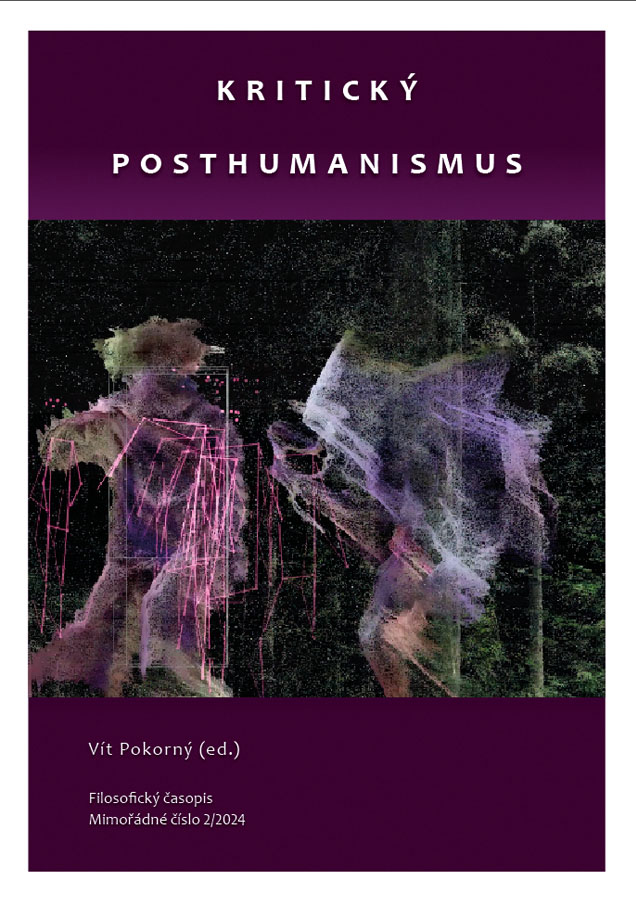
Toto mimořádné číslo Filosofického časopisu je věnováno posthumanismu, tedy širokému myšlenkovému proudu, který se na filosofické rovině zabývá vztahem lidského a nelidského a navazuje na odkaz poststrukturalismu ve smyslu odvratu od antropocentrického, logocentrického a koloniálního založení myšlení. Publikace vychází z příspěvků přednesených na konferenci Kritický posthumanismus, která se konala na FF UJEP v Ústí nad Labem v květnu 2022. Podařilo se zde shromáždit texty, které k problému posthumanismu přistupují skutečně kriticky, tedy jako k výzvě pro myšlení, jejímž jádrem je tázání po místu člověka v kosmu a po povaze naší současné situace. Shromážděné texty jsou tak výrazem společného úsilí o hledání nových podob myšlení a budou jistě vhodným příspěvkem do diskuze o vztahu lidského a mimolidského.
Jan Bíba (ed.): Democracy and Opinion. On Nadia Urbinati´s Democratic Theory
Special Issue of The Philosophical Journal 1/2024
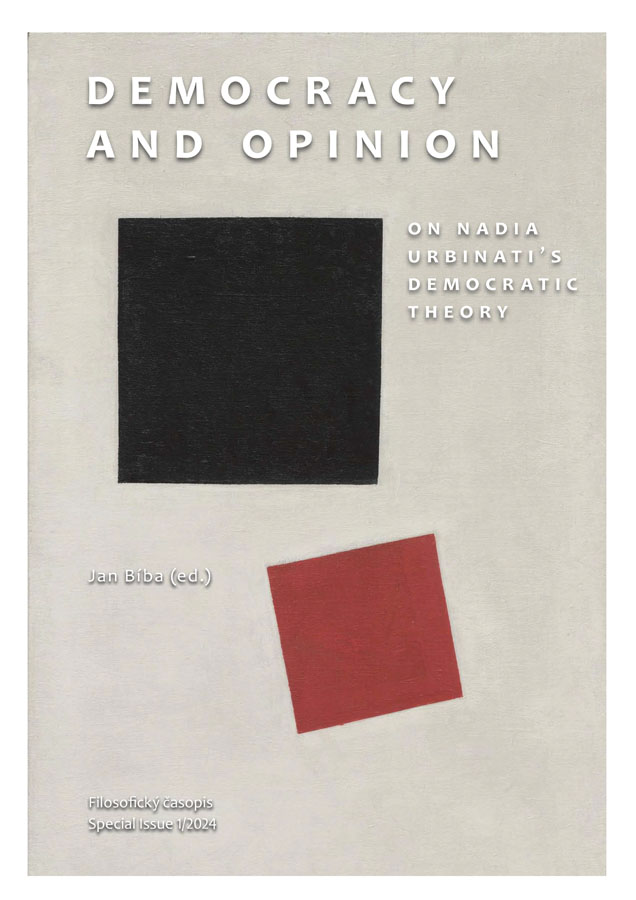
In what we have come to see as a time of crisis for democracy, it is important to refl ect not only on the dangers facing contemporary democracies but also on the nature of democracy itself. The articles collected in this volume aim to engage with the work of the Italian political theorist Nadia Urbinati and her conception of representative democracy as diarchy. The volume provides a discussion of many of the vital concepts in contemporary democratic theory and of the challenges that contemporary democracies must tackle, including populism, oligarchy, and the rise of illiberal democracy. Some of the articles herein also draw on the recent Central European experience of democratic backsliding.
Ondřej Váša (ed.): Worlds without People. The “Inhuman” in Contemporary Philosophy and Art
Special Issue of The Philosophical Journal 1/2023
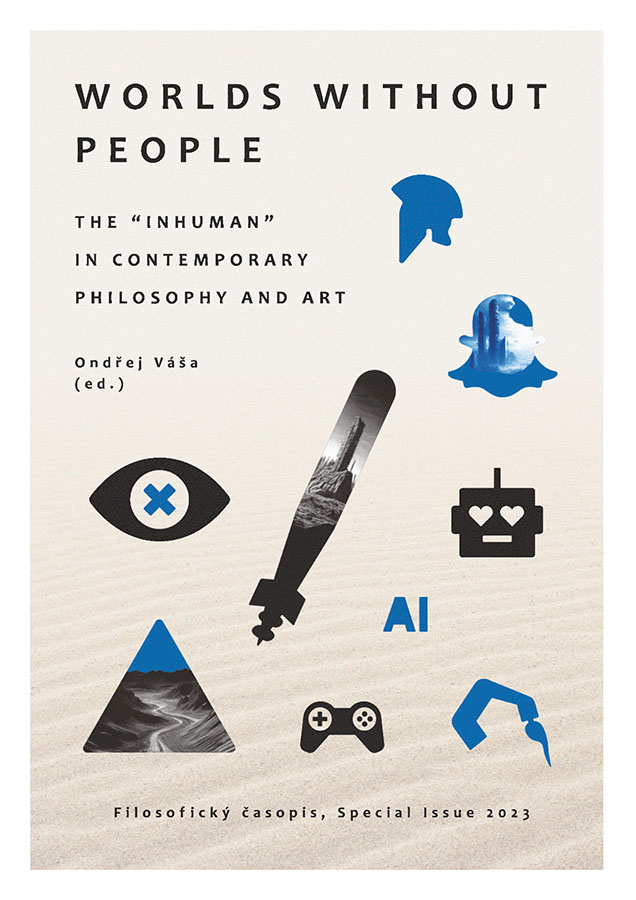
This special issue enters into worlds without people, and embarks on images that are above all testimonies to the failure of sight, thought, or ethics. At least human one. We have chosen artistic, game, film, and media images that present to us the manifestations of the inhuman: whether creatures, or a world that excludes human beings as something unbecoming. ln the now quite rich and complex terrain of transhumanism, or various versions of post-humanism, however, we have also focused on these moments that are constitutive of humans today: that is, the moments that critically expose us to our own inhumanity, and place before us the demand for a new ontology.
Niklas Forsberg, Ulrika Björk (eds.): The Dissident. Six Readings of “The Power of the Powerless” by Václav Havel
Special Issue of The Philosophical Journal 1/2022

This special issue is devoted to rereading and reassessing Václav Havel’s seminal essay “The Power of the Powerless”, in the light of the present day culture and ethico-political scene. The Chartist efforts to pursue a non-political politics, lead us to reflect upon power relations and pre-political textures, where existential, political and ethical concerns are allowed to come forth as intermingled, not only with each other but also with questions about language, symbolism and truth. The papers collected here are investigations into how these forms of interconnection and intertwining between ethics, existential concerns, authenticity, language, meaning and truth look.
Michal Chabada, Róbert Maco (eds.): Varieties of Naturalism in Contemporary Philosophy
Special Issue of The Philosophical Journal 3/2021, 125 pages

Naturalism has been at the centre of meta-philosophical debates for quite some time. It dominates in most branches of theoretical philosophy and its influence is increasingly felt in the domain of practical philosophy. Not only adherents of this movement, but also its critics, are already aware that this is not just a fleeting fashion, but a serious attempt to reorientate and redefine the entire philosophical enterprise. The contributions collected in this special issue seek to do justice to this situation and to the multifaceted character of contemporary philosophical naturalism. The diversity of topics covered in the essays, from naturalistically orientated ethics through epistemology and metaphysics to critical reactions to contemporary naturalism, reflects this complexity. The common feature of all contributions is the effort to better understand the current state of philosophy, regardless of whether their authors align with the naturalistic movement or are critical of it.
Jakub Jinek (ed.): The Rule of the People and the Rule of Law in Classical Greek Thought
Special Issue of The Philosophical Journal 2/2021, 144 pages
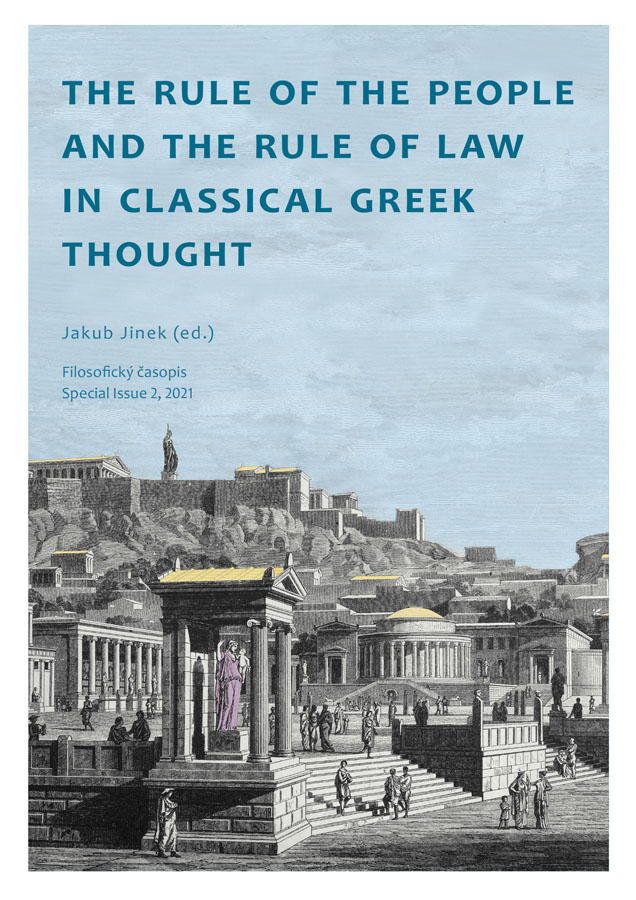
A common feature of the contributions collected in this special issue of the Philosophical Journal is the effort to grasp the relationship between the rule of the people and the rule of law, which has been a central problem of political philosophy since its origins in classical times. The articles deal with the original Greek understanding of the law and its relation to democracy, the sophistic problematization of this relationship (under the title of the opposition physis – nomos), and especially its new conception in the work of Plato and Aristotle. The authors of the papers are experts on ancient political thought associated with the research network Collegium Politicum.
Jakub Chavalka (ed.): The Spectres of Selfhood
Special Issue of The Philosophical Journal 1/2021, 220 pages
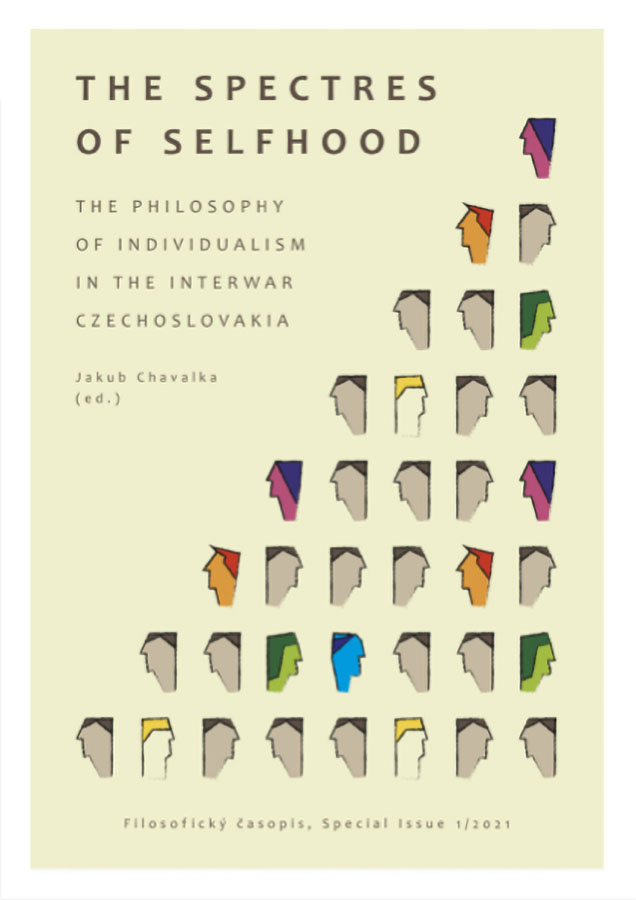
Individualism as a concept did not have a very good reputation in the interwar Czechoslovakia. Yet, already Masaryk and later on Peroutka made a significant appeal to the cornerstone of democracy – personality. The aim of the publication is to show how the thinkers with the biggest cultural and spiritual influence of the time dealt with the problem of creating a strong individuality, and what troubles they had to face. None of them (perhaps with the exception of Ladislav Klíma) declared individualism as the centre of their philosophical thinking. However, a closer look at their philosophy points to interconnectedness of the “struggle for individuality” with the struggle of the newly created Republic for its self-determination. After all, some of the thinkers understood nation or state as autonomous individual, albeit collective. The intentions of the authors of this collection of texts is to help better understand how the problem of individuality formed our own history.
Jan Makovský (éd.) : Leibniz et leibnizianismes
Special Issue of The Philosophical Journal 2019, 220 pages
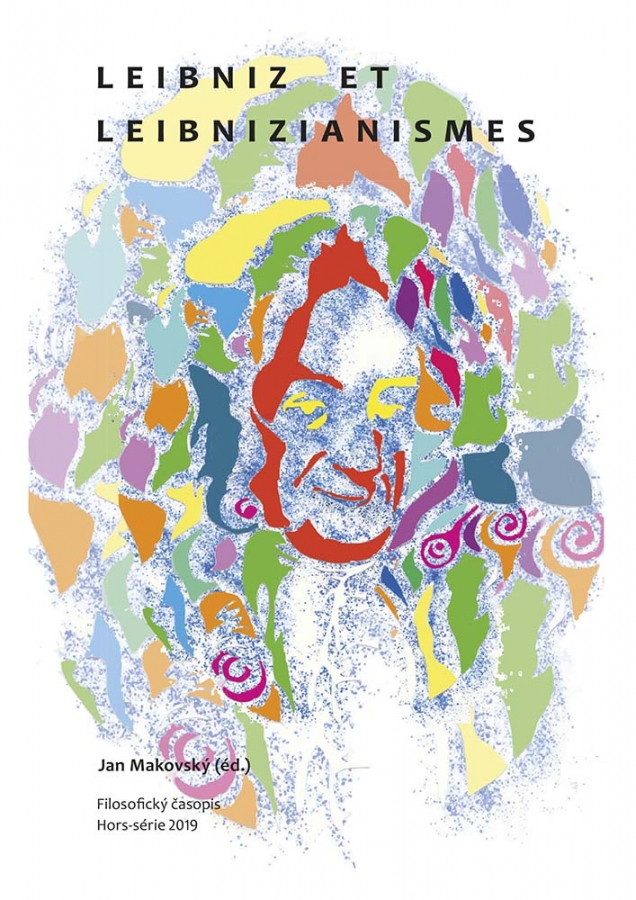 « Le présent est gros de l’avenir, le futur se pouvoit lire dans le passé, l’éloigné est exprimé dans le prochain », remarque Leibniz dans ses Principes de la nature et de la grâce fondés en raison. Rapportée d’abord à notre lecture, ensuite à notre compréhension actuelle de Leibniz, cette déclaration si caractéristique de son écriture même nous, lecteurs et successeurs, incite à formuler et à reformuler une multitude de questions sur tout le « passé futur » de la pensée leibnizienne : pour lire dans son présent et pour en donner l’avenir. Y a-t-il quelque chose comme le leibnizianisme ? La nature même de la pensée de Leibniz l’autorise-t-il ? Est-ce que nous pouvons postuler une continuité qui serait en mesure de comprendre ses propres divergences ? À l’heure actuelle, plusieurs sociétés leibniziennes s’attèlent à la tâche laborieuse d’élucider le legs du philosophe de Hanovre. Où en sommes-nous aujourd’hui dans la compréhension du legs de Leibniz et du ou des leibnizianisme(s) ?
« Le présent est gros de l’avenir, le futur se pouvoit lire dans le passé, l’éloigné est exprimé dans le prochain », remarque Leibniz dans ses Principes de la nature et de la grâce fondés en raison. Rapportée d’abord à notre lecture, ensuite à notre compréhension actuelle de Leibniz, cette déclaration si caractéristique de son écriture même nous, lecteurs et successeurs, incite à formuler et à reformuler une multitude de questions sur tout le « passé futur » de la pensée leibnizienne : pour lire dans son présent et pour en donner l’avenir. Y a-t-il quelque chose comme le leibnizianisme ? La nature même de la pensée de Leibniz l’autorise-t-il ? Est-ce que nous pouvons postuler une continuité qui serait en mesure de comprendre ses propres divergences ? À l’heure actuelle, plusieurs sociétés leibniziennes s’attèlent à la tâche laborieuse d’élucider le legs du philosophe de Hanovre. Où en sommes-nous aujourd’hui dans la compréhension du legs de Leibniz et du ou des leibnizianisme(s) ?
Zdeněk V. David – Martin Dekarli – Phillip N. Haberkern – David R. Holeton (eds.): The Bohemian Reformation and Religious Practice 11
Special Issue of The Philosophical Journal 2018/1, 238 pages
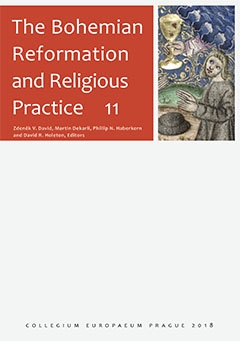
This publication is divided into four thematic blocks and emerged through the collaboration of experts currently active in Europe, America, and Asia. The first deals with Jan Hus (“The Person and Work of Jan Hus”), the second deals with the issue of violence and the inquisition (“Hussite Revolution and Inquisition”), the third contains texts on the Utraquist liturgy (“Liturgy”), and the last discusses the interaction of the Czech and European Reformation (“Utraquism and Reformation”). A total of twelve studies reflect the phenomenon of the Czech Reformation in the late Middle Ages and the early modern era, and in the spirit of the intentions of Collegia Europaea it seeks to internationalize research into Czech religious history and its philosophical, theological, church-political, and cultural context.
Chavalka J. – Sikora O. (eds.): Nietzsche o ctnosti
Mimořádné číslo Filosofického časopisu 2018/2, 204 stran
 Předkládaný svazek je věnován vrcholné fázi Nietzschova myšlení, jež zahrnuje v prvé řadě knihu Tak pravil Zarathustra. Společným tématem jednotlivých studií je motiv ctnosti, kterému se obzvláště ve vystupňované podobě obdarovávající ctnosti věnuje většinou méně pozornosti než tématům, jako jsou věčný návrat téhož, smrt boha či vůle k moci. Společnou snahou autorů je poukázat na centrální roli tohoto motivu a interpretovat jej v rámci Zarathustry a spisů zachycujících „poledne“ Nietzschova myšlení. Vedle imanentně zarathustrovských studií svazek přináší stati dialogické, v nichž je motiv ctnosti konfrontován s perspektivou dalších myslitelů.
Předkládaný svazek je věnován vrcholné fázi Nietzschova myšlení, jež zahrnuje v prvé řadě knihu Tak pravil Zarathustra. Společným tématem jednotlivých studií je motiv ctnosti, kterému se obzvláště ve vystupňované podobě obdarovávající ctnosti věnuje většinou méně pozornosti než tématům, jako jsou věčný návrat téhož, smrt boha či vůle k moci. Společnou snahou autorů je poukázat na centrální roli tohoto motivu a interpretovat jej v rámci Zarathustry a spisů zachycujících „poledne“ Nietzschova myšlení. Vedle imanentně zarathustrovských studií svazek přináší stati dialogické, v nichž je motiv ctnosti konfrontován s perspektivou dalších myslitelů.
Ševčík M. – Dostálová L. (eds.): Studie k teorii umění Henriho Focillona, Život forem v žitém světě
Mimořádné číslo Filosofického časopisu 2018/3, 88 stran
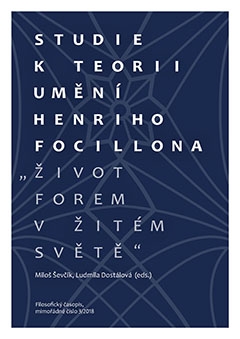
Soubor studií českých a slovenských autorů, který zde předkládáme, vznikl na základě příspěvků přednesených na odborném semináři věnovaném myšlení francouzského historika a teoretika umění Henriho Focillona (1881–1943). Seminář se uskutečnil 4. května 2017 na půdě Katedry filozofie Fakulty filozofické Západočeské univerzity v Plzni. Uspořádáním tohoto semináře i publikací tohoto souboru článků chceme upozornit na originalitu v dnešní době spíše pozapomenutého Focillonova myšlení a na jeho podnětnost ve vztahu k soudobé estetice a filosofii. Předložený soubor studií, který upozorňuje na některé ze stránek formálního myšlení a cítění, o němž Focillon v souvislosti s uměním hovoří, doplňujeme překladem pozoruhodného Focillonova pojednání „Chvála ruky“.
Jan Bíba a Milan Znoj (eds.): A Crisis of Democracy and Representation
Special Issue of The Philosophical Journal 2017/1, 122 pages
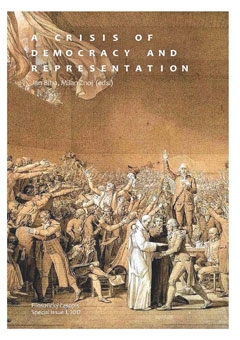
Democratic societies (both new and established) are currently undergoing a deep crisis. It is almost impossible to overlook the symptoms; a decline in voter turnout, the rise of right-wing populism and plebiscitarianism, civil dissatisfaction, and the decline of traditional partisanship. The origin of this crisis is often seen in the crisis or disintegration of traditional representative institutions. While such developments lead some to infer the demise of representative democracy and celebrate the emergence of post-representative democracy, a significant portion of contemporary democratic theory on the contrary (and apparently paradoxically) turns to representation as a tool for democratizing democracy. This move may seem surprising not only for the de facto crisis of representative institutions, but also because many streams of contemporary democratic theory (participatory, deliberative, and radical theories of democracy) were formulated as a critique of the inherently undemocratic and elitist or oligarchic nature of representative democracy and as an effort to overcome it. The articles gathered in this volume seek to capture this intellectual movement and offer new reflections on the relationship between democracy and representation as a tool for both understanding and treating the crisis of democracy.
Daniel Heider, Lukáš Lička, Marek Otisk (eds. ): Perception in Scholastics and Their Interlocutors
Special Issue of The Philosophical Journal 2017/2, 160 pages
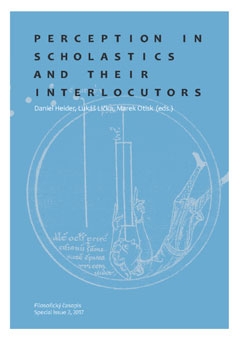
The Special Issue Perception in Scholastics and Their Interlocutors presents eight studies examining the issues of perception and senses in the history of philosophy between the 11th and 17th centuries. Attention is focused mainly on scholastic thinkers (from Anselm, through Peter John Olivi and Duns Scotus, to Suárez), some older authors whose thoughts developed other scholars (e.g. Aristotle or Ibn al-Haytham), or contemporaries who entered into dialogue with scholastics (e.g. Pletho or Valerianus Magnus).
Petr Dvořák, Tomáš Machula (eds.): Explorations in Late Scholasticism
Special Issue of The Philosophical Journal 2016, 208 pages.
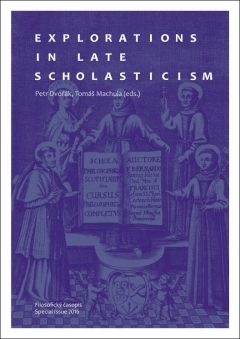
The Special Issue Explorations in Late Scholasticism consists of nine scholarly studies that focus on various topics of “second scholasticism”. This previously underestimated stream of philosophical and theological thought of the 16th and 17th centuries is currently the subject of intense research interest. It turns out that this study is helping to better understand well-known early modern authors such as Descartes, Leibniz, and others. Moreover, it is a sophisticated elaboration of a number of ideas from earlier medieval scholastics. Last but not least, the second-scholastic solutions to philosophical problems also inspire purely contemporary discussions within analytic philosophy. The authors, leading Czech and foreign researchers in the field, present interesting topics from the field of ethics, philosophical anthropology, theory of cognition, and metaphysics. They thus follow up on the efforts of Professor Stanislav Sousedík, to whom the book is dedicated on the occasion of his jubilee.
Filosofický časopis © 2021